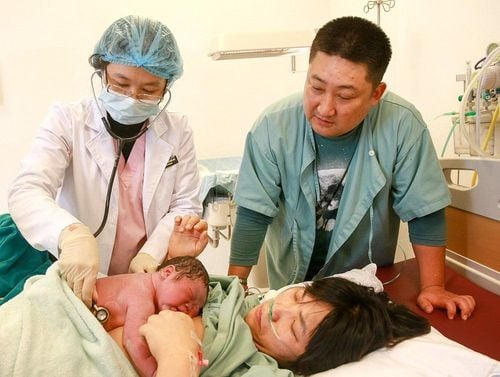This is an automatically translated article.
The article was professionally consulted with Master, Doctor Dang Huy Toan - Department of Pediatrics - Neonatology - Vinmec Nha Trang International General Hospital.Cow's milk protein allergy is a condition in which a child's body becomes very sensitive to the protein in cow's milk. This is the most common type of food allergy in children, especially infants. Signs that your baby is allergic to cow's milk protein is the result of the body having a reaction to this food, which can affect other organs.
1. What is cow's milk protein allergy?
Cow's milk protein allergy is a phenomenon that occurs when the immune system of children, especially in infants, has an overly sensitive reaction to the protein in cow's milk. This is the most common food allergy in infants and young children because cow's milk is the first strange protein-containing food that this group of children has to absorb in a large amount, especially those who have been exposed to cow's milk. drink powdered milk before.When babies and infants have a cow's milk protein allergy, their immune system will wrongly recognize cow's milk proteins as harmful substances and will react to these proteins and cause severe allergic reactions. Signs your baby is allergic to cow's milk protein.
2. Causes of cow's milk protein allergy in children
When a baby's body mistakenly recognizes that the protein components present in cow's milk are harmful, it automatically produces IgE immune antibodies that neutralize these proteins. There are two main types of protein in cow's milk that cause cow's milk protein allergy: Casein in the curd part, and Whey in the liquid milk left after the curd has curdled. The next time the baby's body is exposed to these proteins in cow's milk, IgE antibodies have been produced that will recognize and signal the immune system to release histamine and other chemicals. allergy mediators. It is these substances that will cause the baby's signs of cow's milk protein allergy.The exact cause of cow's milk protein allergy in children is currently unknown, but according to research, allergies are inherited, so children will be at high risk of developing milk allergy if Parents with a history of allergic diseases such as fever, itching or food allergies.

Nguyên nhân gây dị ứng đạm sữa bò ở trẻ là gì?
3. How to know if your baby is allergic to cow's milk protein?
Cow's milk protein allergy can cause a wide range of symptoms, with varying degrees of severity depending on the disease and timing. Signs of cow's milk protein allergy usually appear within 2 hours or after 48 hours from the time the baby drinks cow's milk. Disease-specific effects may manifest on the skin, respiratory and gastrointestinal tract.Signs your baby has a cow's milk protein allergy include immediate symptoms and symptoms that appear later.
3.1 Immediate symptoms Shortness of breath; Swelling of lips, tongue, face; Skin rash, hives, rash, itching; Eczema is a manifestation of atopic dermatitis; Vomiting after breastfeeding; Diarrhea signs. 3.2 Late symptoms Eczema, itching, redness; Runny nose, persistent cough, wheezing; A lot of crying; Abdominal cramps; Vomiting, reflux; Constipation; Frequent bowel movements, loose stools with blood. These symptoms can make the child wake up and cry all night, be tired when eating, and slow down the baby's weight gain. In case the breastfed baby is allergic to cow's milk protein, there will be manifestations such as colic, eczema. However, the above symptoms can also appear for other diseases, not just for cow's milk protein allergy, so parents need to take their child to see a doctor as soon as there are abnormal signs to be diagnosed. guess correctly.

Triệu chứng tức thời là khó thở, sưng môi, mặt, lưỡi,...
4. Caring for children with cow's milk protein allergy
Children with abnormal symptoms as above when going to the doctor will be assigned to do cow's milk protein allergy tests. If the diagnosis is cow's milk protein allergy, it is necessary to abstain from cow's milk and foods derived from cow's milk.Besides, in case of cow's milk protein allergy in infants, it is necessary to strictly control the foods that both mother and baby put into the body, carefully check the source to see if there is milk or not.
Children with cow's milk protein allergy will also tend to be allergic to other types of milk such as goat's milk, because the protein in goat's milk has a similar composition to the protein in cow's milk. Therefore, it is necessary to abstain from milk of other animals and it is best to breastfeed, maintain a reasonable scientific diet.
5. Prevention of cow's milk protein allergy in children
Most children grow up to be completely allergic to cow's milk protein, between the ages of 1 and 4, when their immune systems mature. However, it is necessary to do some tests for cow's milk protein allergy before concluding that the baby is completely cured and can eat normal foods again.The method of preventing cow's milk protein allergy, especially cow's milk protein allergy in infants, is currently breastfeeding. Since breast milk is the best way to protect babies from the possibility of food allergies, it contains proteins from the mother that can best be tolerated by the baby, and contains ingredients that have protective functions. for the child's immature digestive system before foreign protein sources.
For those who are not able to breastfeed and the baby is in the group of allergies, the mother should give the baby formula milk with fully hydrolyzed protein to prevent the allergy to the maximum. Cow's milk protein for children.
When seeing signs that the baby is allergic to cow's milk protein, parents must take the baby to a medical facility to be tested and diagnosed with cow's milk protein allergy, from which there are ways to deal with the allergy. This child's. In addition, eating a diet with cow's milk protein and breastfeeding also plays an important role in preventing children from having cow's milk protein allergy.
Pediatrics Department at Vinmec International General Hospital is the address for receiving and examining diseases that infants and young children are susceptible to: digestive diseases, viral fever, bacterial fever, inflammation middle ear, pneumonia in children, .... With modern equipment, sterile space, minimizing the impact as well as the risk of disease spread. Along with that is the dedication from the doctors with professional experience with pediatric patients, making the examination no longer a concern of the parents.
Please dial HOTLINE for more information or register for an appointment HERE. Download MyVinmec app to make appointments faster and to manage your bookings easily.













